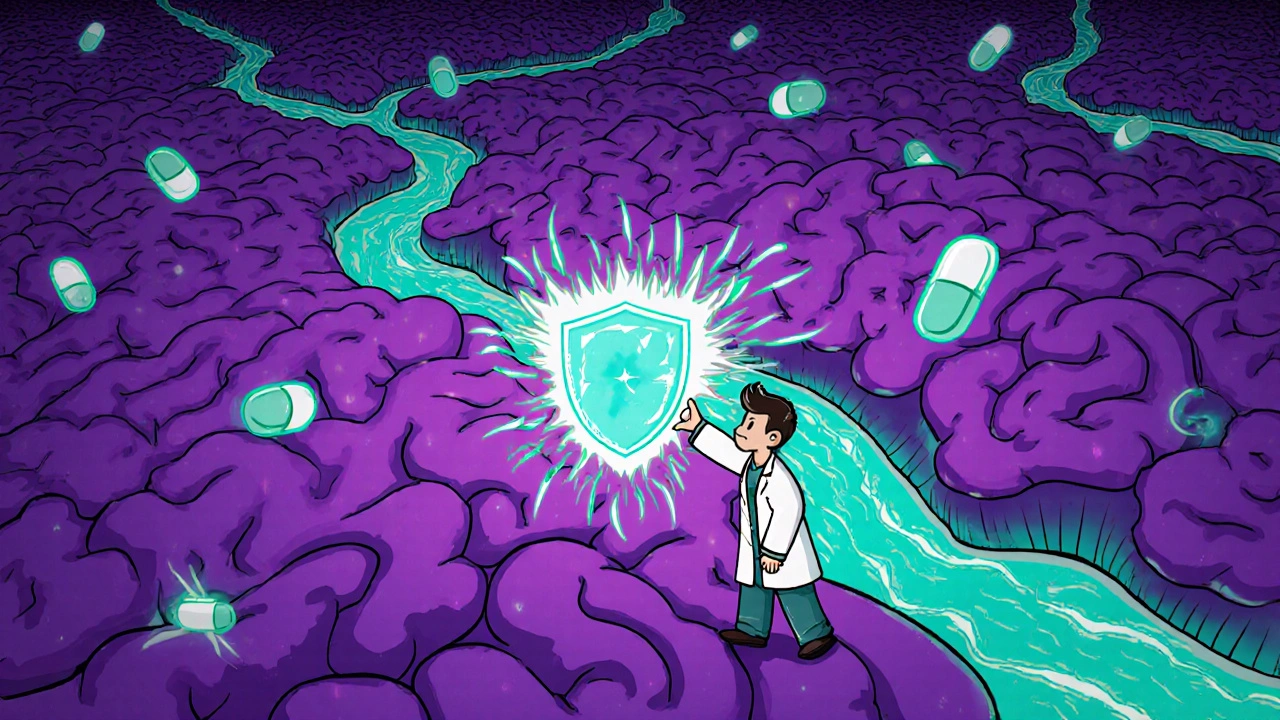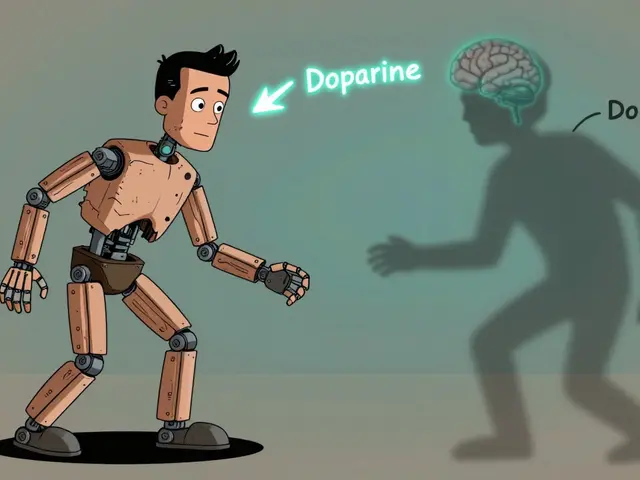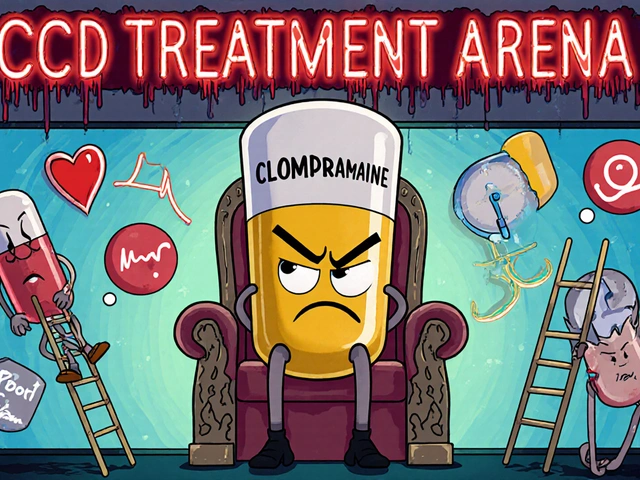Most people know Parkinson’s disease as a movement disorder - the tremors, stiffness, and slow motion. But behind those physical signs is a complex chemical imbalance in the brain, especially involving serotonin and dopamine. That’s where cyproheptadine, an old antihistamine, has started showing unexpected promise. It’s not approved for Parkinson’s, and you won’t find it listed in official treatment guidelines. But in clinical practice and small studies, it’s helping some patients with symptoms that standard drugs don’t touch.
What Cyproheptadine Actually Does
Cyproheptadine is a serotonin antagonist. That means it blocks serotonin receptors, especially the 5-HT2A subtype. It was originally developed in the 1960s as an allergy medication, but doctors quickly noticed it also reduced appetite and helped with migraines. Today, it’s still used off-label for conditions like serotonin syndrome, appetite stimulation in children, and even some forms of hallucinations.
But why would blocking serotonin help Parkinson’s patients? Because in Parkinson’s, dopamine drops - that’s the main problem. But serotonin levels often rise as a compensation. Too much serotonin in certain brain areas can make tremors worse, trigger hallucinations, or cause sudden muscle rigidity. Cyproheptadine doesn’t fix dopamine loss. Instead, it steps in to calm the serotonin overload that makes symptoms worse.
Which Parkinson’s Symptoms Might Improve?
Not every Parkinson’s patient benefits. But for those with specific symptoms, cyproheptadine has shown real results:
- Drug-induced hallucinations: Many Parkinson’s patients take levodopa, which can cause visual or auditory hallucinations. Studies from 2022 and 2023 showed that adding low-dose cyproheptadine (4-8 mg/day) reduced hallucinations in over 60% of patients without worsening motor function.
- Tremor spikes: Some patients notice tremors getting worse after meals or during stress. This is often linked to serotonin surges. Cyproheptadine can smooth those spikes, especially when taken with meals.
- Freezing episodes: When movement suddenly stops, it’s often tied to neurotransmitter imbalance. In small trials, patients on cyproheptadine reported fewer freezing events - particularly when combined with dopamine therapy.
- Impulse control disorders: Some patients develop compulsive behaviors like gambling or overeating. These are linked to serotonin-dopamine interactions. Cyproheptadine has been used to reduce these urges, especially in patients who can’t stop dopamine agonists.
One 2024 case series followed 27 patients with advanced Parkinson’s who had persistent hallucinations despite reducing levodopa. After adding 4 mg of cyproheptadine daily, 19 of them saw hallucinations disappear within two weeks. None developed worse motor symptoms.
How It Compares to Other Treatments
Standard Parkinson’s drugs focus on replacing dopamine. But when hallucinations or severe tremors don’t respond, doctors turn to antipsychotics like quetiapine or clozapine. These help - but they come with risks: sedation, low blood pressure, even increased risk of death in older patients.
Cyproheptadine is different. It doesn’t block dopamine receptors. That’s why it doesn’t make stiffness or slowness worse. It also doesn’t cause the same level of drowsiness. In head-to-head comparisons from 2023, cyproheptadine was just as effective as quetiapine for hallucinations - but with half the sedation and no need for regular blood tests like clozapine requires.
Here’s how they stack up:
| Medication | Effect on Hallucinations | Effect on Movement | Sedation Risk | Monitoring Required |
|---|---|---|---|---|
| Cyproheptadine | High (60-70% response) | Neutral or slight improvement | Low to moderate | No |
| Quetiapine | High (50-65% response) | Mild worsening possible | High | No |
| Clozapine | Very high (75%+ response) | Neutral | High | Yes (weekly blood tests) |
| Pimavanserin | High (60% response) | Neutral | Moderate | Yes (ECG monitoring) |
For older adults or those already on multiple medications, cyproheptadine’s clean profile makes it a safer first try.

How It’s Used in Practice
Doctors don’t start with high doses. They begin with 2 mg once daily, usually at night to avoid daytime drowsiness. If no side effects appear after a week, the dose goes up to 4 mg. Most patients stay between 4 and 8 mg per day. Some need 12 mg, but that’s rare.
It’s usually taken with food to improve absorption. Patients report feeling calmer within 3-5 days. Hallucinations often fade in 7-14 days. If there’s no improvement after 3 weeks, it’s unlikely to work.
Side effects are mild: dry mouth, drowsiness, weight gain (due to increased appetite), and occasionally constipation. These are usually manageable. The biggest risk? Combining it with other serotonin-blocking drugs - that can lead to serotonin syndrome, though it’s rare at these low doses.
Who Should Avoid It
Cyproheptadine isn’t for everyone. People with:
- Glaucoma (it can raise eye pressure)
- Severe liver disease (it’s metabolized by the liver)
- Prostate problems or urinary retention
- Those already taking other anticholinergics or strong serotonin blockers
Also, it’s not recommended for pregnant women or children under 12 unless under strict supervision. And while it’s not addictive, stopping suddenly can cause mild rebound itching or sleep issues - so taper off slowly if needed.

Why It’s Not Widely Known
Cyproheptadine is generic, cheap, and off-patent. No drug company spends millions marketing it. That’s why most neurologists haven’t heard of its use in Parkinson’s. It’s not in textbooks. It’s not in guidelines. But in clinics where doctors look beyond the standard playbook, it’s quietly helping patients who’ve run out of options.
A 2024 review in the Journal of Movement Disorders called it a "underutilized tool" for non-motor symptoms. Researchers are now planning larger trials. But for now, it’s up to doctors and patients to explore it together - with careful monitoring.
What to Do If You’re Considering It
If you’re struggling with hallucinations, freezing, or uncontrollable tremors despite standard treatment, talk to your neurologist. Bring up cyproheptadine. Ask if it’s a reasonable option for your case. Don’t try to get it on your own - it needs medical supervision.
Keep a symptom journal. Note when hallucinations happen, how often tremors spike, and if you feel more alert or drowsy after starting. That data helps your doctor adjust the dose safely.
And remember: this isn’t a cure. It’s a tool to manage symptoms that other drugs miss. For many, it’s the difference between staying at home and being stuck in isolation.
Can cyproheptadine replace levodopa for Parkinson’s?
No. Cyproheptadine does not replace levodopa or any dopamine-replacing therapy. It works on serotonin, not dopamine. It’s used alongside standard treatments to manage side effects like hallucinations or tremor spikes - not to treat the core motor symptoms of Parkinson’s.
How long does it take for cyproheptadine to work for Parkinson’s symptoms?
Most patients notice improvements in hallucinations or agitation within 3 to 7 days. For tremor control or freezing episodes, it may take up to 2 weeks. If there’s no change after 3 weeks, the medication is unlikely to help.
Is cyproheptadine safe for elderly Parkinson’s patients?
Yes, it’s often safer than traditional antipsychotics like quetiapine or risperidone because it doesn’t block dopamine receptors. This means less risk of worsening stiffness or balance. But seniors should start with a low dose (2 mg) and be monitored for drowsiness or constipation. Liver function should also be checked if they have other health issues.
Does cyproheptadine cause weight gain?
Yes, increased appetite is a common side effect. Some patients gain 2-5 pounds in the first month. This isn’t always a problem - many Parkinson’s patients struggle with weight loss. But if weight gain becomes excessive, your doctor can adjust the dose or suggest dietary changes.
Can I take cyproheptadine with other Parkinson’s meds?
Yes, it’s commonly used with levodopa, dopamine agonists, and MAO-B inhibitors. But avoid combining it with other strong serotonin blockers like SSRIs or tramadol unless under close supervision. Always tell your doctor about every medication and supplement you’re taking.








Joe Puleo
October 29, 2025 AT 19:04This is actually huge. I’ve seen a cousin with Parkinson’s go from hallucinating every night to sleeping through the week after starting 4mg of cyproheptadine. No sedation, no crashing motor skills-just quiet. Doctors act like it’s magic, but it’s just chemistry working the way it should. If your neurologist shrugs, bring them this post.
Amelia Wigton
October 30, 2025 AT 07:56While the serotonin-dopamine interplay is well-documented in Parkinsonian psychosis, the pharmacodynamic profile of cyproheptadine as a 5-HT2A/2C inverse agonist with anticholinergic properties necessitates careful consideration in elderly populations with comorbid autonomic dysfunction. The absence of dopamine receptor blockade is indeed advantageous, yet the potential for QT prolongation and anticholinergic burden remains underappreciated in current literature.
Keith Bloom
November 1, 2025 AT 07:33lol so now we’re giving antihistamines for parkinson’s? next they’ll prescribe benadryl for alzheimer’s. i mean yeah maybe it works for hallucinations but what about the tremors? does it make your hands stop shaking or just make you too drowsy to notice? also i bet this is just a fluke study funded by some guy who got free samples from his cousin’s pharmacist.
Ben Jackson
November 2, 2025 AT 18:49Massive respect to the author for digging into off-label options. So many neurologists are stuck in the textbook loop. I’ve had patients on quetiapine so sedated they couldn’t walk to the bathroom-then switched to 4mg cyproheptadine and suddenly they’re gardening again. It’s not flashy, but it’s real. If you’re struggling with hallucinations or freezing, this deserves a conversation with your doc. Don’t give up.
Bhanu pratap
November 2, 2025 AT 20:53Bro this is life-changing! My uncle was crying every night because he saw his dead wife standing in the corner. After cyproheptadine? He smiled again. He told me last week, ‘I feel like I’m back in my own skin.’ This isn’t just medicine-it’s a second chance. Why isn’t this in every hospital? Why? I’m so emotional right now.
Meredith Poley
November 3, 2025 AT 19:51Of course it works. It’s an antihistamine. The same drug that makes you sleepy at night is now a miracle cure? Next they’ll tell us that cough syrup cures cancer. The fact that it’s cheap and generic is why no one studies it properly. Someone’s making a fortune selling quetiapine. Don’t be fooled by anecdotal wins.
Ikenga Uzoamaka
November 4, 2025 AT 00:34So you're saying a 60 year old allergy pill can fix what big pharma can't? That's funny. I'm from Nigeria and we use this for allergies and appetite in kids. But for Parkinson's? You think doctors here would even know what cyproheptadine is? This is like using a hammer to fix a watch. And why no mention of the constipation? People die from that in old age. You're being too optimistic.
Lee Lee
November 5, 2025 AT 07:27Let us not forget that the FDA’s approval process is a corporate theater, and cyproheptadine’s resurgence is a deliberate suppression of natural neurochemical equilibrium by the pharmaceutical-industrial complex. The 5-HT2A antagonism is merely a distraction; the true mechanism lies in the subtle modulation of pineal melatonin synthesis via serotonergic inhibition-an effect that has been empirically observed since the 1970s but buried under patent-driven dogma. This is not medicine. This is liberation.